German Chancellor Angela Merkel said on a visit to the flood-stricken region of Germany that she was horrified by the "surreal, eerie" devastation she witnessed, pledging quick aid to rebuild.
"It is shocking - I can almost say that the German language doesn't have words for the destruction that's been wreaked," she told reporters.
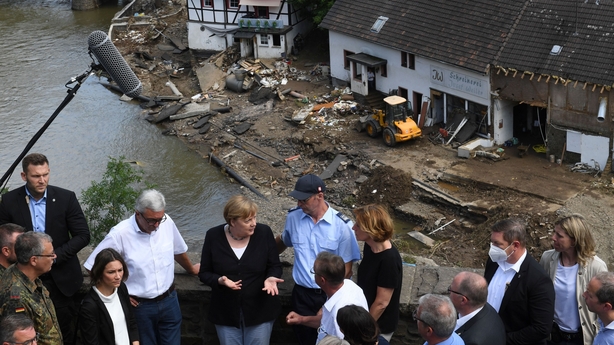
The death toll from devastating floods has risen to 156 in Germany, police said, bringing the total to at least 183 fatalities from the disaster in western Europe.
In Rhineland-Palatinate state alone, one of the worst-hit regions in western Germany, police reported 110 dead, up from 98 previously.
"It is feared that other victims will be added," police said in their statement, which also said 670 people were injured in the region alone.
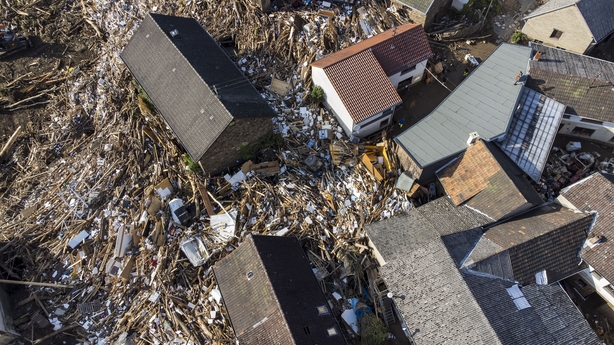
Questions are mounting about whether the country's weather warning system failed to keep citizens safe.
Although meteorological services had forecast torrential rain and flash floods for western Germany last week, many residents said they were caught off-guard by rapidly rising waters that destroyed roads, bridges and homes.
"We shouldn't be mourning this many fatalities in 2021," Hannah Cloke, a professor of hydrology at Reading University, told German broadcaster ZDF.
There had been "breaks in the warning chain" somewhere along the way, she said, and messages to evacuate or shelter in place on higher floors did not get through to enough people.
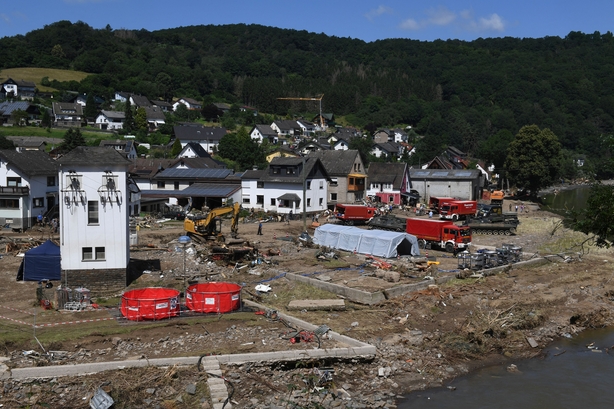
Under Germany's federal system, it is up to the 16 regional states to organise responses to flood alerts and coordinate efforts with the civil protection office and the fire brigade.
Many local authorities use sirens, loudspeaker announcements or radio and TV bulletins to warn residents of acute danger or issue evacuation orders.
There are also smartphone apps to keep users up to date on extreme weather in their area.
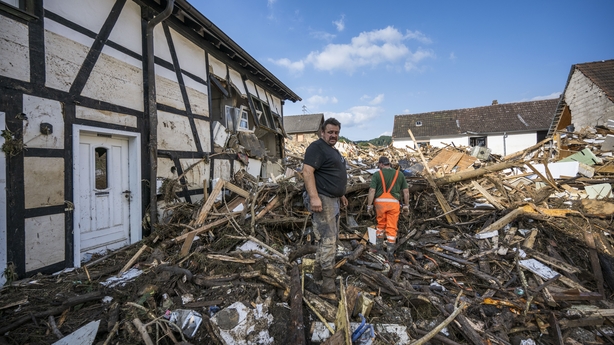
But Bild newspaper condemned the "failure" to take early action in the battered states of Rhineland-Palatinate and North-Rhine Westphalia.
"The sirens stayed quiet in plenty of places, very few alerts were issued," it wrote, labelling the deadly flooding that followed "a disaster for civil protection, one of the state's most essential jobs".
Malu Dreyer, the state premier of Rhineland-Palatinate, surveyed the devastation in the nearby town of Schuld on Sunday and insisted that communities had heeded the weather warnings and "had all activated their flood defence systems", including sirens in certain areas.
But she acknowledged that downed power lines and mobile phone outages had complicated efforts to reach everyone.
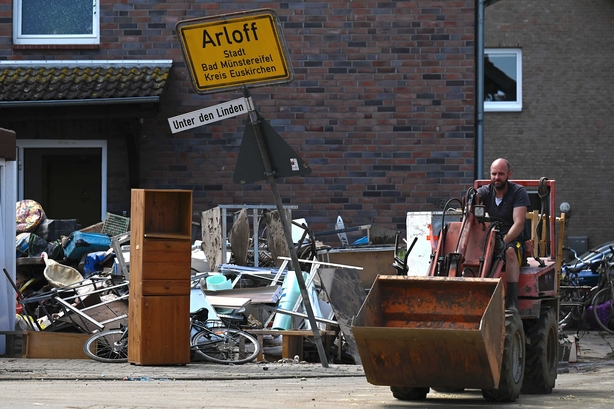
Gerd Landsberg, head of the German Association of Towns and Municipalities, called for an overhaul of the early warning system.
"People had the impression that it was just heavy rain, the dramatic scale of it was not clearly communicated," he told the Funke newspaper group.
He called for more staff and more competencies for the Federal Office for Civil Protection and Disaster Assistance, and said the siren system should be used more widely so people can receive messages even when the electricity is out.
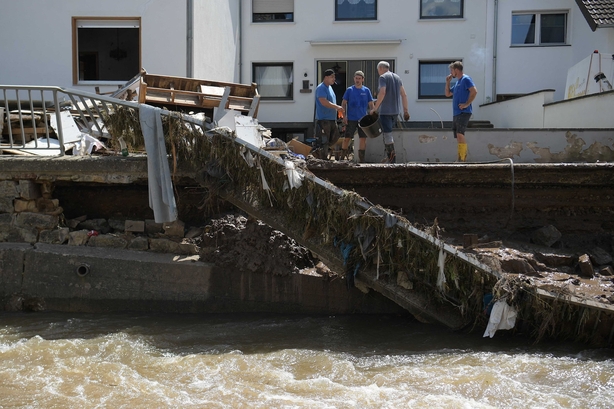
Minister for Research Anja Karliczek said Germany must prepare better for natural disasters, expected to become more frequent because of climate change.
"One of the lessons of this catastrophe in western Germany is that we must improve our research into these extreme weather episodes in the next few years," she said.
Chancellor Angela Merkel, who visited the flood zone in Rhineland-Palatinate on Sunday, said lessons should be learnt but cautioned against overly high expectations.
"Of course we ask ourselves what can be done better?" she said. "But in some situations things happen so quickly that you can't fully escape the force of nature."
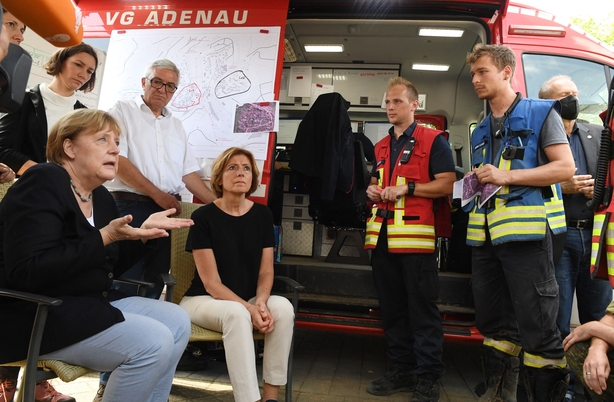
The number of Belgian residents confirmed dead has risen to 31 on Sunday, according to official figures, as authorities said they were calling an end to rescue operations.
"There is no longer an immediate danger in the affected areas," the country's crisis centre said late Sunday, adding that "rescue operations are over but search operations continue in some areas".
"Clean-up and estimating the material damage are now in focus," it added.
Police were sent to knock on doors to check for further potential victims in the affected areas, mostly in Belgium's south and east.
Many remain cut off from communications after losing their phone or for want of electricity to recharge batteries, while others were taken to hospital without identity papers.
In the hardest-hit town of Pepinster more than 1,000 people had to be evacuated.
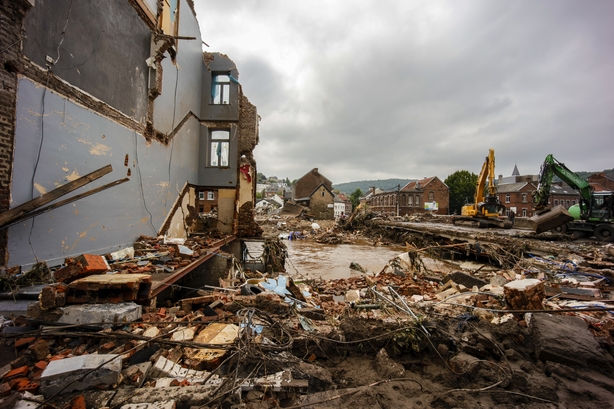
More than 37,000 homes are still without power and 3,600 without gas on Sunday, authorities said, while rail operator Infrabel said there was disruption to almost half of the train services nationwide.
While many people have set up donation drives to help those suffering in the floods, authorities urged people to give money to the Red Cross.
European Commission President Ursula von der Leyen and Belgian Prime Minister Alexander de Croo visited the flooded areas of Rochefort and Pepinster together on Saturday.
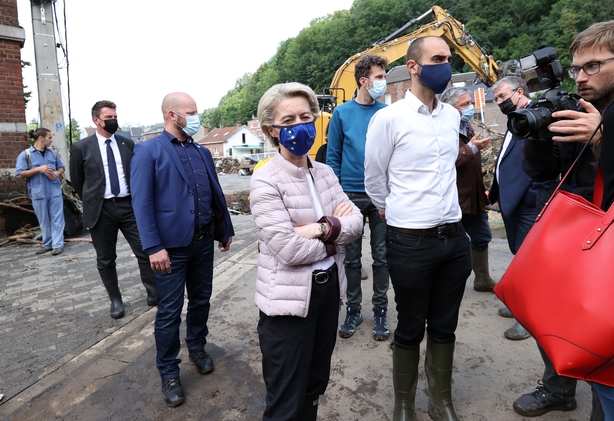
"Europe is with you," Ms von der Leyen tweeted afterwards. "We are with you in mourning and we will be with you in rebuilding."
Belgium has declared Tuesday a day of official mourning.
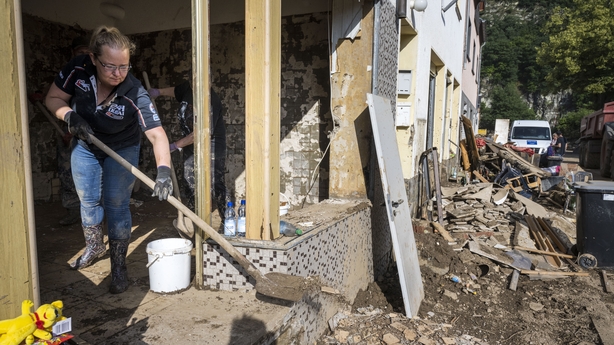
In Austria, firefighters were on high alert in the Salzburg and Tyrol regions while the historic town of Hallein was under water.
"Heavy rains and storms are unfortunately causing severe damage in several places in Austria," Chancellor Sebastian Kurz said on Twitter.
Further east, in the Saxony region on the border between Germany and the Czech Republic, rivers also rose last night, causing damage.
Rescue crews in both Germany and Belgium are still sifting through rubble to find victims after torrential rain led to deadly floods | https://t.co/251jj8A6AM pic.twitter.com/S1HpigOj5s
— RTÉ News (@rtenews) July 18, 2021
Rescue crews in both Germany and Belgium were sifting through rubble to find victims, often in dangerous conditions.
The historic downpours also battered Switzerland, Luxembourg and the Netherlands.
Ms Merkel has called the floods a "tragedy" and pledged support from the federal government for Germany's stricken municipalities.
Speaking alongside US President Joe Biden at the White House on Thursday, Ms Merkel said her "heart goes out to all of those who in this catastrophe lost their loved ones".
The government has said it is working to set up a special aid fund, with the cost of damage expected to reach several billion euro.
The disaster has increasingly taken on political overtones in Germany, which heads to the polls on 26 September for a general election that will mark the end of Chancellor Merkel's 16 years in power.
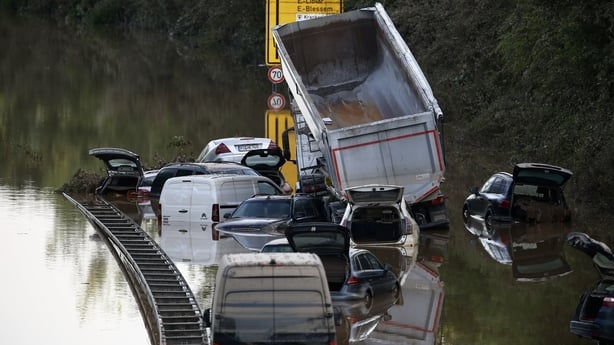
With experts saying climate change is making extreme weather events like these more likely, candidates vying to succeed the veteran leader have called for more climate action.
Armin Laschet, the premier of hard-hit North-Rhine Westphalia state and frontrunner in the race for the chancellery, said efforts to tackle global warming should be "speeded up".
But Mr Laschet, who heads Merkel's CDU party currently leading in opinion polls, scored an own goal yesterday when he was filmed laughing in the devastated town of Erftstadt in NRW, where a landslide was triggered by the floods.
In the footage, Mr Laschet could be seen chatting and joking in the background as President Frank-Walter Steinmeier gave a statement expressing his sympathies to grieving families.
"Laschet laughs while the country cries," wrote the top-selling Bild daily.
Mr Laschet later apologised on Twitter for the "inappropriate" moment.
The scale of the flood impact was gradually becoming clear in Germany, with damaged buildings being assessed, some of which will have to be demolished, and efforts under way to restore gas, electricity and telephone services.
In some areas, soldiers used armoured vehicles to clear the debris clogging streets.
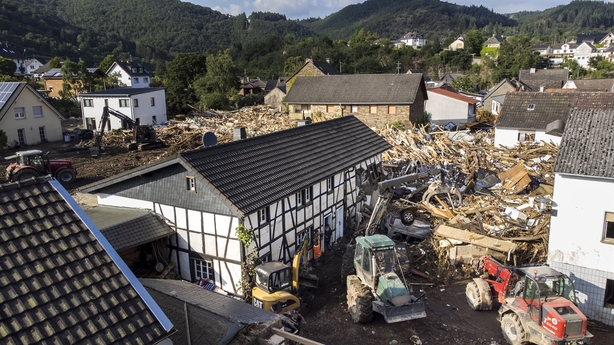
In NRW, divers were sent in to search submerged homes and vehicles.
Local authorities in NRW and Rhineland-Palatinate said dozens of people remain unaccounted for across both states.
They have stressed, however, that disruption to communication networks made a precise assessment difficult, and the real number of missing could be lower.
Roger Lewentz, interior minister for Rhineland-Palatinate, said more than 670 people were injured.
"I've lived here my whole life, I was born here, and I've never seen anything like it," said Gregor Degen, a baker in the devastated spa town of Bad Neuenahr-Ahrweiler, near Schuld.

